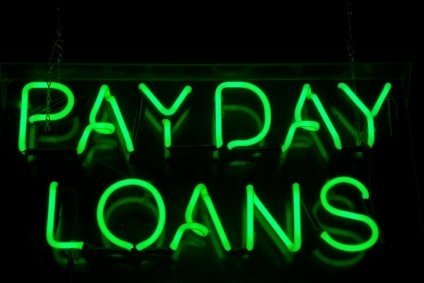If you’ve ever been strapped for cash and turned to a payday lender for financial help, it’s possible that the payday loan agreement you entered into is actually illegal.
According to a recent story published on PublicIntegrity.org, a man from Puyallup, Washington got a payday loan from Ameriloan, but soon found that the lender was repeatedly “renewing” the loan and collecting on it without reducing the borrower’s debt load.
Even though these terms were laid out in the fine print, this gentleman – like most people in a cash crunch – probably didn’t notice that this “renewal” loan arrangement was a big red flag.
When the borrower realized that there was a problem, he contacted the state Department of Financial Institutions and learned that Ameriloan was not licensed to make payday loans in the state of Washington. This meant that the borrower was no longer obligated to pay back the loan. He closed his bank account and made no further payday loan payments.
Could your payday loan also be illegal?
If you’ve fallen into the trap of taking out payday loans, getting one of these “easy money loans” could end up costing more than you realize.
To find out whether your payday loan is even legal, follow these steps:
Check with state authorities
You can check the legal status of payday loans by state using this online tool on the PayDay Loan Consumer Information website, which is a service of the Consumer Federation of America.
(Read: Disadvantages of Getting a Payday Loan)
It’s also important to realize that some states allow payday lending, and some states don’t.
Thirty-two states permit payday lenders to make loans against checks written on consumers’ bank accounts. Lenders can charge interest as high as they’d like on payday loans in the following states: Alabama, Alaska, California, Delaware, Florida, Hawaii, Idaho, Illinois, Indiana, Iowa, Kansas, Kentucky, Louisiana,
Michigan, Minnesota, Mississippi, Missouri, Nebraska, Nevada, New Mexico, North Dakota, Oklahoma, Rhode Island, South Carolina, South Dakota, Tennessee, Texas, Utah, Virginia, Washington, Wisconsin, and Wyoming.
The other 18 states, and the District of Columbia, prohibit payday loans. The areas where payday lending is illegal include: Arizona, Arkansas, Colorado, Connecticut, Georgia, Maine, Maryland, Massachusetts, Montana, New Hampshire, New Jersey, New York, North Carolina, Ohio, Oregon, Pennsylvania, Vermont, Washington D.C., and West Virginia.
Determine whether the lender is licensed
Regardless of the company you’ve borrowed from, remember that a payday lender must be licensed or the loan is not collectable. If they are breaking the law by lending wrongfully (i.e. without a license), you are not under any obligation to pay it back.
Be especially careful about online payday loans
Even though you may have been tempted to get a payday loan online, you may have entered into an agreement with a lender that is not authorized to grant loans in your state. If you have already entered into an online agreement, make sure you’ve read the terms very carefully. Some terms may involve an automatic renewal of the loan every few weeks, which can make it virtually impossible to pay back the loan within a reasonable amount of time.
(Read: 7 Ways to Get Rid of Your Payday Loans)
Find out where the lender is based
Some online lenders are located overseas or offshore, which can be a red flag that they are trying to grant loans illegally. Try to verify as many details about the origin of the lending organization and from where they are operating. Take the time to read reviews or find ratings on the lender or lending institution to determine what other borrowers have said about the company.
Obviously, it’s best to avoid payday loans altogether – mainly since these loans often charge triple-digit interest rates.
But if you’re already on the hook for one of these high-cost loans, at least you should make sure it’s a legal loan.
Otherwise, you can rightfully walk away from that payday loan knowing that particular financial burden is legally off your back.









